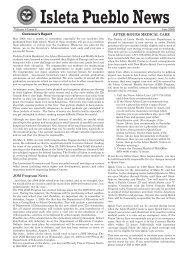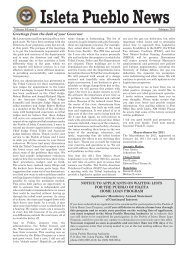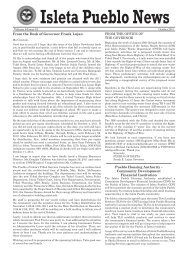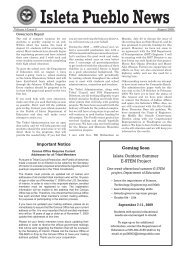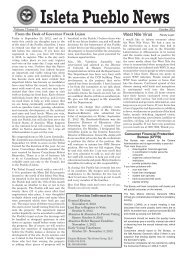Create successful ePaper yourself
Turn your PDF publications into a flip-book with our unique Google optimized e-Paper software.
Page 6 <strong>Isleta</strong> <strong>Pueblo</strong> News <strong>January</strong> 2012<br />
A Summary Report to Governor Frank Lujan, Tribal Council<br />
and the <strong>Isleta</strong> <strong>Pueblo</strong> Membership<br />
By: Fred R Lujan, Tribal Council President<br />
On December 1st and 2nd, 2011 the<br />
leadership from the 265 tribes throughout<br />
the country were invited to Washington<br />
D.C. by the President <strong>of</strong> the United States<br />
Barack Obama to attend the 3rd Annual<br />
White House Tribal Nations Conference.<br />
This Conference is in line with keeping his<br />
campaign promise to meet each year with<br />
all the Indian Tribes to discuss Native<br />
American issues. Unfortunately only one<br />
leader from each tribe could attend. Due<br />
to Governor Lujan's commitments here at<br />
the <strong>Pueblo</strong>, the Tribal Council authorized<br />
my attendance. On Thursday December 1,<br />
2011 the leadership met by regions at the<br />
Eisenhower Executive Office Building with<br />
Cabinet Secretaries to identify the topics<br />
and issues for presentation to the President.<br />
This was an arduous task to develop and<br />
consolidate all the issues from each tribe.<br />
Five themes were chosen, however were not<br />
limited to other issues identified by regions;<br />
(Southwest region in our case. For Example,<br />
California, Nevada, Arizona, New Mexico,<br />
Colorado and Utah). 1. Creating jobs and<br />
Growing Tribal Economics 2. Promoting<br />
Safe and Strong Tribal Communities. 3.<br />
Protecting Natural Resources and Respect<br />
Cultural Rights. 4. Improving Access<br />
to Health Care, Education, Housing,<br />
Infrastructure, and other Federal Services.<br />
5. Strengthening the Government to<br />
Government Relationship.<br />
Taxation and Economic Development<br />
Current tax policy for Indian tribes is<br />
inconsistent and fails to recognize Indian<br />
tribe's inherent exclusive jurisdiction to<br />
levy taxes within the exterior boundaries<br />
<strong>of</strong> tribal lands. Most Tribal governments<br />
are not set up to do Economic Development.<br />
(The <strong>Pueblo</strong> <strong>of</strong> <strong>Isleta</strong> incorporated the <strong>Isleta</strong><br />
Business Council in 2010 for this purpose).<br />
Indian tribes that produce goods and<br />
services are finding it difficult to capture<br />
international markets due to interference<br />
by major commercial companies. There are<br />
many grant funding opportunities for Tribes<br />
to assist in Developing Tribal Economies.<br />
Many Tribes oppose the grant concept<br />
due to the requirement that Tribes should<br />
match the grant funding by 20% most Tribes<br />
cannot afford the match for multimillion<br />
dollar projects. Recommendations were<br />
to protect the taxing jurisdiction <strong>of</strong> Tribal<br />
Nations, provide access to Capital for<br />
job creation in tribal communities and<br />
promote Economic growth and increase<br />
Tribal access to Traditional financing tools.<br />
Tribes are encouraged to create outdoor<br />
tourism. Tribes must have a well trained<br />
workforce in order to be successful in any<br />
business venture. Also we need to support<br />
Entrepreneurship on Tribal lands.<br />
Energy<br />
Tribal Nations possess vast amounts<br />
<strong>of</strong> Natural Resources, yet are unable to<br />
develop those resources due to a lack <strong>of</strong><br />
administrative flexibility and unequal access<br />
to traditional incentives used to develop<br />
energy. Many Tribes are experiencing<br />
difficulties with power and utility companies.<br />
Tribes are being encouraged to create their<br />
own communication, utility and power<br />
companies and sell back the power not<br />
utilized. Solar and Broadband initiatives are<br />
encouraged. Due to the shortage <strong>of</strong> gas and<br />
oil the Federal Government is interested<br />
in working with Tribes with Capability <strong>of</strong><br />
producing airline fuel. Tribes recommended<br />
to create a joint task force (Departments <strong>of</strong><br />
Energy, Interior, Agriculture, and EPA)<br />
with Tribal Representatives to recommend<br />
and implement ways to consolidate funding,<br />
reporting, and other requirements for<br />
programs that support similar activities<br />
related to tribal energy development.<br />
Public Safety<br />
The Department <strong>of</strong> Justice released its July<br />
11, 2011 legislation proposal that seeks to<br />
address the epidemic <strong>of</strong> domestic violence<br />
against American Indian and Alaska Native<br />
women. Congress needs to restore funding<br />
to implement the Tribal Law and order act.<br />
Gang activity is in our schools and native<br />
communities. Tribal police are working<br />
with all jurisdictions to curb gang violence.<br />
However, they need a lot <strong>of</strong> monetary<br />
support from the federal government.<br />
Homeland Security<br />
Tribal governments have broad emergency<br />
and first-responder responsibilities. The<br />
Federal Emergency Management Agency<br />
(FEMA), which is administered under this<br />
department, provides assistance when<br />
disasters occur. However, it has limitations.<br />
Tribes must work through the states to get<br />
a disaster declaration from the governor<br />
which takes too long. Tribes want to bypass<br />
the states and deal directly with FEMA.<br />
Natural Resources<br />
Tribes are America's first stewards. We<br />
have cared for the land for millennia,<br />
managing resources for the generations<br />
yet unknown and using knowledge,<br />
traditions and practices handed down by<br />
our ancestors, still today, the physical<br />
cultural, social, economic, and spiritual<br />
well-being <strong>of</strong> our Native people depend<br />
upon the health <strong>of</strong> our natural resources.<br />
However, tribal natural resources face a<br />
diverse array <strong>of</strong> threats and inequalities <strong>of</strong><br />
which are generally none <strong>of</strong> tribes making.<br />
Our diverse and rich cultures diverse their<br />
strength and continuity from the land and<br />
natural resources which must be protected<br />
and respected. Indian land is held in trust or<br />
restricted status by the federal government<br />
to protect it from alienation and trespass,<br />
as well as to protect tribal autonomy. It was<br />
recommended that each federal agency with<br />
any natural resource program to identify<br />
those that provide funding to states, local<br />
governments and municipalities but not<br />
to tribal governments, and provide options<br />
for tribal government inclusion. The forest<br />
service and bureau <strong>of</strong> land management<br />
should give the tribes first opportunities<br />
when land is sold.<br />
Water Rights and infrastructure<br />
When Indian Reservations were established<br />
American Indian Tribes researched water<br />
rights, and these are possibly the most<br />
important rights many Indian tribes have<br />
yet to exercise. While the United States<br />
carries the legal obligation as trustee to<br />
protect these rights, federal water policy<br />
and programs have too <strong>of</strong>ten supported<br />
non-native communities to the determent<br />
<strong>of</strong> tribal legal rights. Water is the most<br />
valuable resource and we must protect it.<br />
Recommendations were to provide funding<br />
for the congressionally authorized tribal<br />
water infrastructure projects and for the<br />
ongoing operation and maintenance, also<br />
to support resolution <strong>of</strong> tribal water rights<br />
claims.<br />
Indian Agriculture<br />
Agriculture is <strong>of</strong> growing importance to<br />
Indian economies with an increase in the<br />
number <strong>of</strong> Indian farmers. According to<br />
the census <strong>of</strong> agriculture, annual Indian<br />
agriculture production now exceeds $1.4<br />
billion in row products. The U.S departments<br />
<strong>of</strong> agriculture and its array <strong>of</strong> programs can<br />
and should play an increasingly significant<br />
role in tribal community's enhanced federal<br />
support for agriculture, ranching, natural<br />
resource management, and other activities<br />
would generate significant benefits for tribes.<br />
We need to ensure that tribal nations are<br />
included in the upcoming reauthorization<br />
<strong>of</strong> the farm bill.<br />
Culture Protection<br />
Protecting native culture is necessary for<br />
the survival <strong>of</strong> traditional native religions,<br />
languages, customs, and identity, as well<br />
as for the continuation <strong>of</strong> tribe’s status<br />
as sovereign nation. The culture and<br />
traditional religions <strong>of</strong> Indian people require<br />
the protection <strong>of</strong> the physical integrity <strong>of</strong><br />
the protection <strong>of</strong> the places and objects that<br />
we hold sacred. The federal government<br />
must remove legal and other barriers that<br />
obstruct this sacred spiritual duty <strong>of</strong> care<br />
and protection. Recommendations are (1.)<br />
Uphold and fortify commitments to protect<br />
sacred places and ensure full compliance<br />
with the Native American graves protection<br />
and Repatriation Act. (2.) Issue an executive<br />
order for Branch agencies to take action to<br />
protect and revitalize native languages and<br />
to create a White House initiative on Native<br />
language to coordinate. (3.)Vigorously<br />
enforce the Indian arts and craft art. (4.)<br />
Work with tribes to resolve federal laws,<br />
regulations and policies that deny Indian<br />
access to and usage <strong>of</strong> eagle feathers for<br />
traditional cultural purposes.<br />
Health<br />
Indian Country strongly supports the<br />
implementation <strong>of</strong> health care reforms<br />
and seeks to ensure that Indian Health




